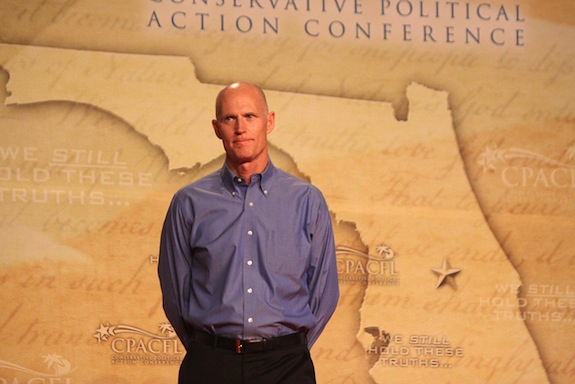
Gov. Rick Scott called the health care law a “disaster” after he failed to get Medicaid expansion passed in Florida. (Photo by Gage Skidmore.)
By Ashley Lopez
Florida Center for Investigative Reporting
Gov. Rick Scott, whose first foray into politics was launching a campaign aimed at stopping momentum for the health care reform law in 2009, is back to criticizing the law.
Earlier this year, Scott said he supported a voluntary provision in the law that allows states to expand Medicaid to low-income residents. In Florida, this provision would have given 1.1 million people health insurance, which they could otherwise not afford. The expansion, a key part of the Affordable Care Act, has been extensively criticized by Republicans. It is also designed to be fully funded by the federal government for the first few years.
Scott’s sudden support of the expansion surprised many in Florida politics, but his support didn’t seem to go much further than his State of State speech. Upon the start of the legislative session this year, the governor pushed for his agenda, but his lobbying did not include Medicaid expansion.
As The New York Times reported towards the end of the legislative session:
In a rare visit to the Florida Senate, where she once served, United States Representative Debbie Wasserman Schultz, who is chairwoman of the Democratic National Committee, chastised Mr. Scott for failing to lobby House Republicans more aggressively.
“While it’s very nice that Governor Scott has had a deathbed conversion and decided that he does want to accept the federal funds, it’s time for him to get off the sidelines,” she said. “Either he is for accepting those funds and is willing to use his clout and his weight and put the full weight of his office behind that position, or he is not.”
Ms. Wasserman Schultz went on to describe state House Republicans as “spoiled children who are stomping their feet because they didn’t get their way.”
Health care lobbyists said Mr. Scott was serious about Medicaid expansion at the start of the legislative session. Once it became apparent the House would not budge, he put all of his energy into teacher pay raises and a tax cut for manufacturers, they said.
“Given the position of the House and Senate, the way he acted was, ‘Let’s focus on what’s achievable right now and get back to that,’ ” said a longtime hospital lobbyist in Tallahassee, Mark Delegal.
Asked by reporters last month whether he was forcefully pushing Medicaid expansion, Mr. Scott replied, “Both the House and Senate know exactly where I stand.”
By comparison, Scott toured the state making appearances aimed at promoting both teacher pay raises and the manufacturing tax break. Scott did not, however, aggressively campaign for Medicaid expansion. He didn’t stage events promoting the expansion, as he did for the tax break, and he didn’t lobby state legislative leaders.
Scott’s only option now is to call for a special session. He can compel the legislature to move forward on a deal to accept the federal funds, or at least consider it. However, he hasn’t committed to doing that either.
Instead, Scott is back to his former talking points. The Associated Press reports that the governor “told a Pensacola radio station Wednesday the law is a ‘disaster.’ ”
“The president’s health care law is a disaster. It’s going to be bad for patients, it’s going to be bad for businesses, it’s going to be bad for providers. There’s nobody that wins in that bill,” Scott said during an interview on News Radio 1620.
He urged the federal government to give people the option of buying private insurance and to focus on keeping the cost of health care down. But Scott noticeably glossed over his about-face decision earlier this year to support Medicaid expansion. The governor unsuccessfully urged state lawmakers to accept $51 billion federal dollars to expand health care to more than 1.1 million of the state’s poorest residents.
A new study shows this failure to get Medicaid expansion through the Legislature is going to cost Floridians dearly. Not only are Florida taxpayers going to pay for the expansion in states that do accept the federal funds, but they are missing out on billions of dollars that could have come to the state.
The Washington Post’s Wonkblog explained:
The study, by the Rand corporation, looks at the 14 states that have said they will opt out of the new Medicaid funds. It finds that the result will be they get $8.4 billion less in federal funding, have to spend an extra $1 billion in uncompensated care, and end up with about 3.6 million fewer insured residents.
So then, the math works out like this: States rejecting the expansion will spend much more, get much, much less, and leave millions of their residents uninsured. That’s a lot of self-inflicted pain to make a political point.
It’s a truism of health-care politics that the uninsured are impossible to organize. But Obamacare creates an extraordinarily unusual situation. The Affordable Care Act will implemented in states that reject Medicaid. There will be huge mobilization efforts in those states, too, as well as lots of press coverage of the new law. The campaign to tell people making between 133 and 400 percent of poverty that they can get some help buying insurance will catch quite a few people making less than that in its net. And then those people will be told that they would get health insurance entirely for free but for an act of their governor and/or state legislature.
Hospitals, businesses and advocates for the poor have asked Scott, formerly CEO of a large hospital chain, to call a special session to work out Medicaid expansion.
